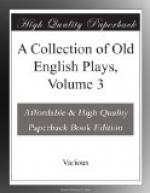[22] A card that cools a player’s courage (I. Hy. VI., v. 3, 1. 83, &c.).
[23] The “Family of Love” was the name given to a fanatical sect; David George, of Delph (obiit 1556), was the founder.
[24] The reference is to the visit of the Marechal de Biron and his suite in the autumn of 1601.
[25] 4tos. Foul.
[26] Pick-thatcht, ed. 1606.
[27] A term in card-playing; to “vie” was to cover a stake.
[28] The name of a famous bear. Cf. Epigrams by J. D.—
“Leaving old Plowden,
Dyer and Brooke alone,
To see old Harry Hankes
and Sacarson.”
Master Slender ("Merry Wives,” I. 1) told Anne
Page: “I have seen
Sackarson loose twenty times and have taken him by
the chain.”
[29] 4tos. King.
[30] The reference is, I suppose, to Roger Bacon’s “Libellus de retardandis Senectutis accidentibus et de sensibus conservandis. Oxoniae, 1590.”
[31] Quy. inframed (F.G. Fleay).
[32] Ed. 1636, “state.”
[33] Ed. 1636 makes sad work of the text here:—
“Merry
clad in inke,
Is but a manner”
&c.
[34] Quy. thridlesse (sc. that cannot be pierced). Mr. Fleay suggests “rimelesse.”
[35] Ed. 1636 reads “antheame.”
[36] “White-boy” was a common term of endearment for a favourite son.
[37] Quy., hot.
[38] i.e., companions.
[39] Doubtless the writer was thinking of Dogberry’s “Comparisons are odorous.”
[40] A pun is intended. “Cast of merlins” = a flight of merlins (small hawks); and “cast-of” = cast-off.
[41] “Foisting-hound.” A small lap-dog with an evil smell, “Catellus graveolens.”
[42] The ‘clap-dish’ which beggars used to beat in order to attract the attention of the charitable.
[43] Both quartos give “all.”
[44] Ovid, Metam., I., 523.
[45] Ed. 1606: Antevenit sortem moribus.
[46] 4tos. weend.
[47] “That most lovely and fervid of all imaginative panegyrics.”—Swinburne’s “Study of Shakespeare,” p. 141.
[48] “Dr. Dodypoll” is a very rare play, to be found only in the libraries of wealthy collectors. The copy in the library of the British Museum is catalogued as “imperfect; wanting Sig. A 2”; but it corresponds in all respects with Mr. Huth’s. Perhaps an “Address to the Reader,” or a “Dedication” was cancelled.
[49] Before the reader goes further, let him turn to Sonnet xvii. in Mr. Swinburne’s series of “Sonnets on English Dramatic Poets.”
[50] The author was doubtless thinking of Romeo and Juliet, iii. 2:—
“And
when he shall die,
Take him and cut him out in
little stars,
And he will make the face
of heaven so fine,
That all the world will be
in love with night,
And pay no worship to the
garish sun.”




